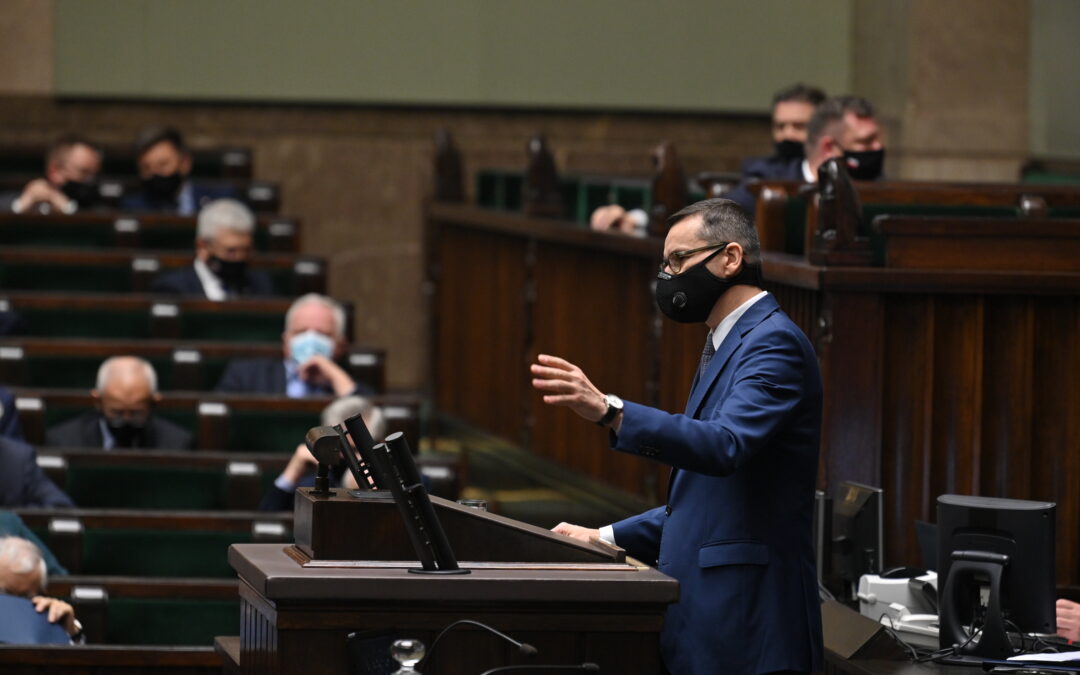Poland’s prime minister, Mateusz Morawiecki, has compared the European Union to Poland’s former communist regime, in a fiery parliamentary speech outlining his government’s opposition to any attempt to links EU funding to respect for the rule of law.
On Monday, Poland and Hungary blocked the passage of the proposed EU budget and coronavirus recovery fund, plunging the bloc into a crisis. The two countries – led by populist governments that have often clashed with Brussels – oppose the inclusion of a rule-of-law mechanism.
“This is not about rule of law – that is just a pretext,” Polish justice minister Zbigniew Ziobro said earlier this week. “This is about institutional, political enslavement, a radical reduction of sovereignty.”
While Morawiecki is generally seen as a more moderate and pragmatic figure, he echoed the rhetoric of Ziobro and his fellow hardliners during an address to the lower house of parliament, the Sejm, this evening.
“The rule of law has become a propaganda bludgeon in the EU,” said the prime minister, quoted by Wprost. “We [Poles] know the use of propaganda bludgeons very well from communist times.”
“A union in which there is a European oligarchy that punishes the weaker and pushes them into a corner is not the EU that we joined,” Morawiecki continued. “This is not an EU that has a future,” he added, saying that adopting a rule-of-law mechanism would cause “the collapse of the EU”.
💬Premier @MorawieckiM w #Sejm.ie:
Unia Europejska🇪🇺, gdzie jest oligarchia, która karze słabszych i wciska ich do kąta, to nie jest UE, do której wchodziliśmy.
To nie jest Unia, która ma przed sobą przyszłość. UE musi się opierać na fundamencie prawa i pewności prawa! pic.twitter.com/dAfEmwmQKd— Sejm RP🇵🇱 (@KancelariaSejmu) November 18, 2020
Too often there is an impression that countries like Poland should gratefully “get on their knees to receive” EU funds “without which we cannot survive”, said the prime minister, quoted by Gazeta Wyborcza.
“If our partners do not understand that we do not agree to unequal treatment of states, to a stick that will always be used against us simply because someone does not like our government, we will indeed use this veto at the end,” warned Morawiecki.
“The EU must be based on the foundation of law and legal certainty; this is what we are fighting for,” said the prime minister, adding that states must have the right to reform their judiciary “in accordance with the [EU] treaties and their own constitution”.
The Polish government has been found by a wide range of institutions and expert bodies to have repeatedly violated the rule of law and Poland’s own constitution. A poll earlier this year showed that a majority of Poles regard the government’s overhaul of the judiciary as an attempt to violate the rule of law.
Morawiecki, however, claimed that, by opposing the rule-of-law mechanism, his government was “conducting a policy purely in the interests of Poland”.
“This is not a division between the left and the right, but between those who want a few officials in Brussels to decide about Poland’s fate and those who care about Poland,” he claimed.
The head of the parliamentary caucus of The Left (Lewica), the third largest group in the Sejm, responded by saying that it is Morawiecki himself who is endangering the national interest by blocking an EU budget that would help Poland rebuild its economy and health service as it recovers from the pandemic.
“These irresponsible steps, which will cost us billions from the EU, [are] being carried out by you and your government without the consent of parliament,” said Krzysztof Gawkowski, quoted by Interia.
Władysław Kosiniak Kamysz, leader of the centre-right Polish People’s Party (PSL), accused Morawiecki of “succumbing to the radicals from his camp”. He warned that, if the government blocks the budget, it will be “farmers, businesspeople, healthcare workers and the sick who will lose out”.
The leader of the largest opposition party, Borys Budka of the centrist Civic Platform (PO), called the prime minister’s speech “a festival of lies, hypocrisy and slander not only against the opposition, but against all our partners in the EU”.
Budka claimed that Morawiecki was a “traitor to the national interest”, saying that the government is “trying to blow up the EU from the inside for its own political interests”. Gawkowski also warned the prime minister not to “destroy Europe”.
Jarosław Kaczyński – the leader of the ruling national-conservative Law and Justice (PiS) party and Poland’s de facto leader – told journalists that he supported the prime minister’s position.
The veto itself – with its unpredictable consequences – has the potential to unleash processes that could develop in risky directions for Poland. All this suits the agenda of more radical elements in the coalition. But the PM's speech largely repeated earlier stated positions.
— Stanley Bill (@StanleySBill) November 18, 2020
“If there are such [rule-of-law] conditions, it is completely obvious [that Poland should veto the budget], because it would be a loss of our country’s sovereignty,” said Kaczyński, quoted by Interia.
Roman Imielski, the deputy editor of the Gazeta Wyborcza daily, which is strongly opposed to PiS, called this evening’s events “Morawiecki’s first Polexit speech” – referring to the idea of Poland leaving the EU, something a large majority of Poles oppose (and which PiS insists it does not want).
However, Jacek Karnowski, editor-in-chief of the pro-PiS wPolityce news website, praised the prime minister for his tough stance against what Karnowski called the “new Munich [agreement]”, a reference to the agreement signed with Hitler in 1938.

Daniel Tilles is editor-in-chief of Notes from Poland. He has written on Polish affairs for a wide range of publications, including Foreign Policy, POLITICO Europe, EUobserver and Dziennik Gazeta Prawna.




















